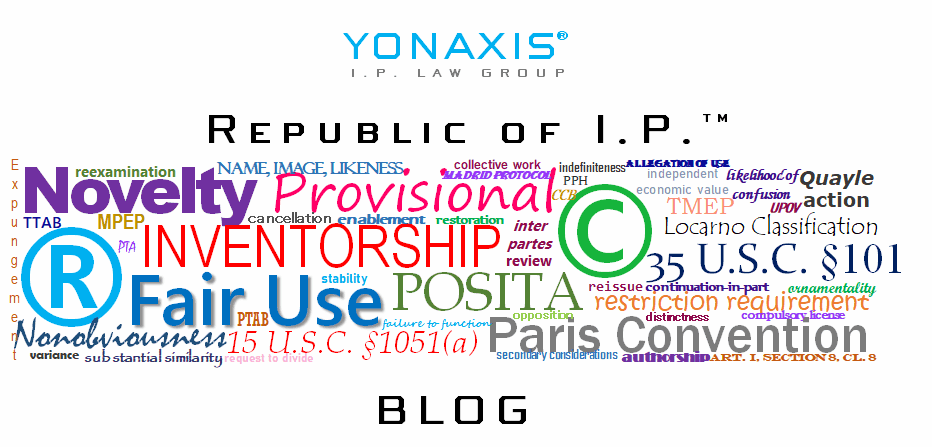Section 101 of the Patent Act, establishes the foundation for what constitutes patentable subject matter in the United States. The seemingly straightforward language – “Whoever invents or discovers any new and useful process, machine, manufacture, or composition of matter, or any new and useful improvement thereof, may obtain a patent therefor” – has generated decades …
Category: 101
35 U.S. Code § 101 – Inventions patentable. Whoever invents or discovers any new and useful process, machine, manufacture, or composition of matter, or any new and useful improvement thereof, may obtain a patent therefor, subject to the conditions and requirements of this title.
Note on the Useful Articles Doctrine in Copyright
Copyright law broadly protects creative works and the human endeavors required to create an original work of authorship. However, creativity should not be confused with utility. A dictionary definition for “creativity” is “ability to make or otherwise bring into existence something new.” A definition for “utility” is “the quality or state of being useful.” A …
Fed Circuit Holds Claims Directed to Milk Not Patent-Eligible Under §101
On February 13, 2023, in ChromaDex, Inc. v. Elysium Health, Inc.,[1] the Court of Appeals for the Federal Circuit issued its first opinion of the year dealing with patent eligibility under 35 U.S.C. §101. Unsurprisingly, the Fed Circuit held that the claims lacked patent-eligible subject matter, and concluded the claims were merely isolated formulations of …
DOJ Urges SCOTUS to Take Up Patent Eligibility
On May 24, 2022, the U.S. Solicitor General filed the government’s views on patent subject matter-eligibility as requested by the U.S. Supreme Court way back in May 2021. The Solicitor General requested that the U.S. Supreme Court grant the petition for certiorari in American Axle & Manuf., Inc. v. Neapco Holdings LLC.[1] The Solicitor General …
Comment Period on Patent Eligibility Extended
On September 2, 2021, the U.S. Patent and Trademark Office extended the deadline for submission of comments regarding the state of patent eligibility and its effectiveness on U.S. investments and innovation. The new date is October 15, 2021. The USPTO issued a notice on the Federal Register on July 9, 2021, requesting comments on patent …
Method of Preparation Claims Patent-Eligible in Illumina Modified Opinion
On August 3, 2020, the Court of Appeals for the Federal Circuit issued a modified opinion in Illumina, Inc. v. Ariosa Diagnostics, Inc.,[1] reiterating its earlier opinion[2] finding claims directed to method of preparing cell-free fetal DNA in maternal blood as patent-eligible subject matter under 35 U.S.C. §101. This modified opinion reflected Ariosa’s recent petition …
American Axle Denied en banc Review
On July 31, 2020, the Court of Appeals for the Federal Circuit denied American Axle’s petition for en banc review, in American Axle & Manuf., Inc. v. Neapco Holdings LLC,[1] with those judges seeking review not able to muster a majority of the entire panel. This is the second iteration[2] of appellate review for American …
SCOTUS Watch: SCOTUS Decides Against Wading into 101 Quagmire
On January 13, 2020, the U.S. Supreme Court denied petitions for writs of certiorari in four cases dealing with patent subject matter-eligibility: HP Inc. v. Berkheimer, Hikma Pharms., Inc. v. Vanda Pharms., Inc., Garmin USA, Inc. v. Cellspin Soft, Inc., and Athena Diagnostics, Inc. v. Mayo Collaborative Servs., which was discussed earlier on this blog. …
SCOTUS Watch: Patent Eligibility Showdown Looming Before Supreme Court
On January 10, 2020, the U.S. Supreme Court will discuss at its first conference meeting whether or not to take up one to four cases dealing with patent eligibility under 35 U.S.C. §101. Patent eligibility has been a contentious source of patent application rejections or invalidations during post-grant litigation. Medical diagnostics and software have been …
Prosecution History Estoppel Limits Design Patent Amendments
A fascinating ruling dealing with design patents, amendments made during prosecution, and limitations on claim scope was handed down by the Court of Appeals for the Federal Circuit on September 12, 2019 in Curver Luxembourg, Sarl v. Home Expressions Inc..[1] Curver is an important piece in an otherwise scant design patent case law. Curver Luxembourg …
